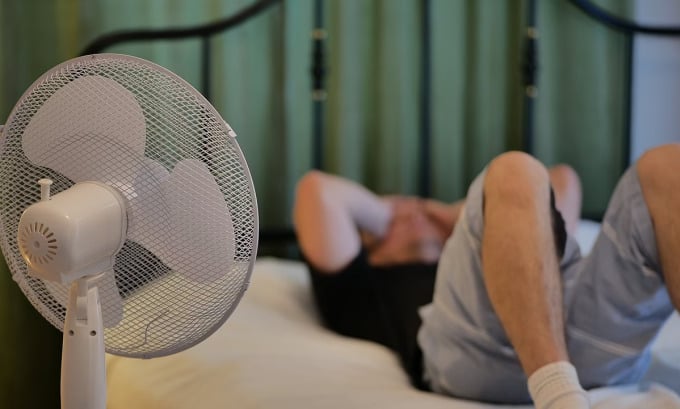Leaving a fan pointed directly at your bed all night can increase symptoms of asthma, allergies, runny nose, dry eyes, stiff neck, and cramps.
On hot days, when temperatures rise above 30 degrees Celsius, many families have the habit of turning on the fan all night, shining directly on the bed. However, Martin Seeley, a sleep expert at MattressNextDay, UK, said this habit can be harmful to health.
Electric fans help circulate air around a room, but they are not good for people with allergies and asthma. They can also blow dust mites, mold spores, pollen, and other allergens into the air, causing a variety of reactions in the body.
“So if you’re experiencing a lot of sneezing, watery eyes, a runny nose, an itchy throat, or difficulty breathing, make sure you clean the dust off your fan blades. If possible, upgrade to a fan with an air-filtering function to reduce the amount of pollen or dust mites in the room,” says Dr. Seeley.
If you use a fan regularly, experts recommend cleaning your bedroom regularly to reduce allergies. The convection air dries out your nose, throat, and eyes, which can also irritate your bronchial tubes. This can cause other side effects such as headaches, nasal congestion, and sinusitis.

A man turns on the fan to go to bed. Photo: Daily Mail
The wind from the fan blowing directly onto the bed can easily cause stiff necks and muscle pain. Dr. Seeley notes that if you have had pain in certain areas of your body due to exercise or incorrect sitting or lying posture, you should limit the fan blowing directly on these areas. The cool air that is concentrated for too long will cause the body to tense up and cramp.
"Some people also get a stiff neck immediately after using an electric fan. Take the fan off for a few nights to see if it improves," says Dr. Seeley.
If you do not want to use fans or air conditioners, experts recommend some methods to cool the room and the body. First, put the pillowcase in the refrigerator before going to bed. People can also soak their wrists in cold water when brushing their teeth, helping the body cool down quickly.
On hot sunny days, experts recommend closing the curtains to block out direct sunlight. This will help keep the room temperature lower at night.
Exposure to ample daylight also helps regulate the body’s internal clock, signaling the brain when to be awake and when to rest. At the end of the day, lying in a completely dark room helps the body relax, fall asleep quickly and forget about the heat.
Drinking at least 2 liters of water a day is also important, it helps increase energy and boost metabolism. Dehydration causes higher body temperature, causing fatigue and restlessness, making it difficult to sleep.
Thuc Linh (According to Express )
Source link





![[Photo] Prime Minister Pham Minh Chinh attends the annual Vietnam Business Forum](https://vphoto.vietnam.vn/thumb/1200x675/vietnam/resource/IMAGE/2025/11/10/1762780307172_dsc-1710-jpg.webp)

![[Photo] Prime Minister Pham Minh Chinh attends the Patriotic Emulation Congress of the Ministry of Foreign Affairs for the 2025-2030 period](https://vphoto.vietnam.vn/thumb/1200x675/vietnam/resource/IMAGE/2025/11/10/1762762603245_dsc-1428-jpg.webp)






















































































![Dong Nai OCOP transition: [Article 3] Linking tourism with OCOP product consumption](https://vphoto.vietnam.vn/thumb/402x226/vietnam/resource/IMAGE/2025/11/10/1762739199309_1324-2740-7_n-162543_981.jpeg)











Comment (0)